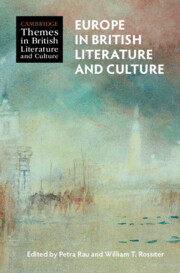Book contents
- Europe in British Literature and Culture
- Cambridge Themes in British Literature and Culture
- Europe in British Literature and Culture
- Copyright page
- Contents
- Illustrations
- Contributors
- General Editor’s Preface
- Acknowledgements
- Introduction
- Part I Zones of Influence
- Part II Pan-European Moods and Movements
- Part III Cultural Transfers
- Chapter 12 Early Modern Print Technologies
- Chapter 13 Diplomacy
- Chapter 14 Grand Tours and Sentimental Journeys
- Chapter 15 Folk and Fairy Tales
- Chapter 16 Translation
- Chapter 17 More or Less English
- Chapter 18 Holocaust Education and Commemoration in Britain
- Chapter 19 Critical and Literary Theory
- Chapter 20 Culinary Longings
- Part IV Anxious Neighbourhoods, Uncertain Futures
- Index
Chapter 20 - Culinary Longings
French Food on British Tables
from Part III - Cultural Transfers
Published online by Cambridge University Press: 06 June 2024
- Europe in British Literature and Culture
- Cambridge Themes in British Literature and Culture
- Europe in British Literature and Culture
- Copyright page
- Contents
- Illustrations
- Contributors
- General Editor’s Preface
- Acknowledgements
- Introduction
- Part I Zones of Influence
- Part II Pan-European Moods and Movements
- Part III Cultural Transfers
- Chapter 12 Early Modern Print Technologies
- Chapter 13 Diplomacy
- Chapter 14 Grand Tours and Sentimental Journeys
- Chapter 15 Folk and Fairy Tales
- Chapter 16 Translation
- Chapter 17 More or Less English
- Chapter 18 Holocaust Education and Commemoration in Britain
- Chapter 19 Critical and Literary Theory
- Chapter 20 Culinary Longings
- Part IV Anxious Neighbourhoods, Uncertain Futures
- Index
Summary
The chapter focuses on the influence of French cuisine in Britain. The innovations of French courtly cuisine were frequently mocked in Britain which had its own tradition of sound and economical country house cooking. The Industrial Revolution brought a loss of cooking skills among the urban poor. The affluent benefitted from the flight of French chefs after the French Revolution, leading to the culinary pretensions of the (equally mocked) Regency period. French chefs set up French restaurants and cooking schools, popularising French cuisine, thus influencing the tastes of the middle classes and stimulating a range of gastronomical writings. Examples from Antony Trollope’s Vanity Fair, Virgina Woolf’s To the Lighthouse, Joseph Conrad’s The Secret Agent, Mike Leigh’s Life is Sweet, Peter Greenaway’s The Cook, the Thief, the Wife and Her Lover and Elizabeth David’s postwar books serve to gauge the extent of French infuence and help define what makes British food, British.
Keywords
- Type
- Chapter
- Information
- Europe in British Literature and Culture , pp. 322 - 336Publisher: Cambridge University PressPrint publication year: 2024

